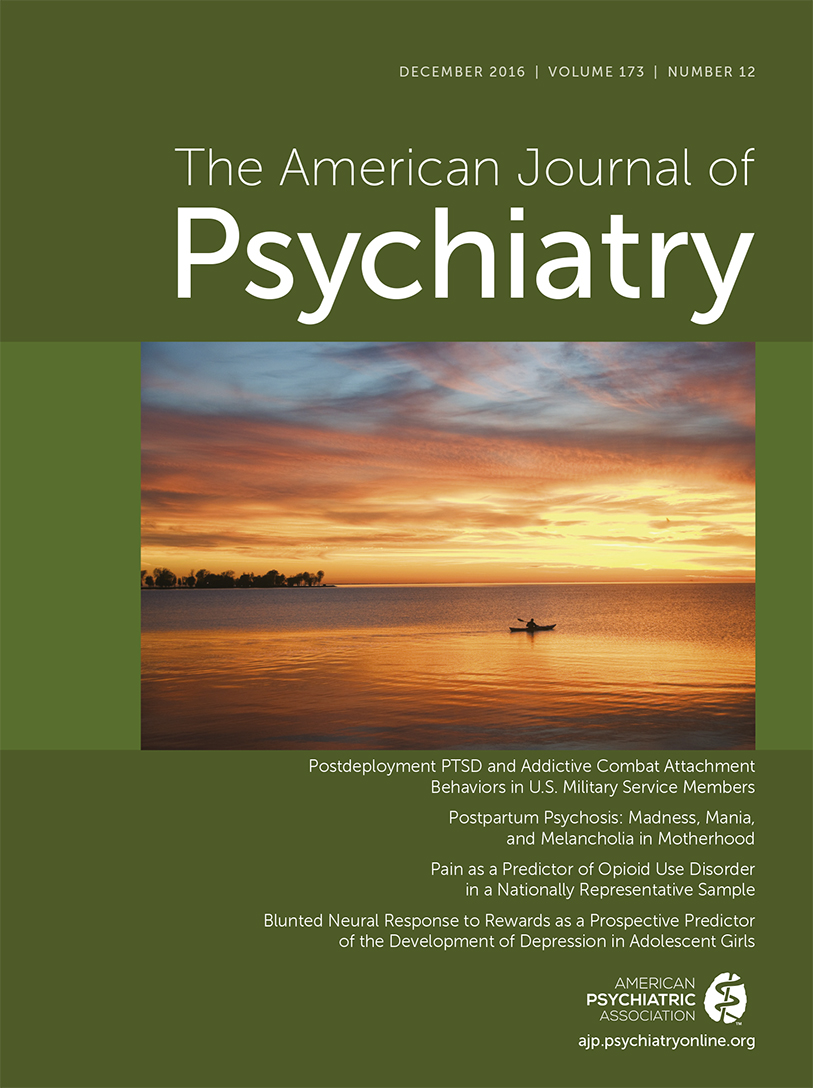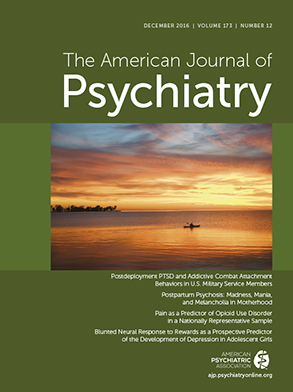Postdeployment PTSD and Addictive Combat Attachment Behaviors in U.S. Military Service Members
Discussion And Case Series
Clinical Case Series.
| Item | N | % |
|---|---|---|
| 1a. Repeated exciting memories, thoughts, or images of combat | 59 | 92.2 |
| 2a. Repeated exciting dreams involving combat | 33 | 51.6 |
| 3a. Suddenly acting or feeling as if a positive/exciting combat experience were happening again (as if you were reliving it) | 36 | 56.2 |
| 4a. Feeling excited when something reminded you of a combat event | 50 | 78.1 |
| 5a. Feeling “a rush” of physical reactions (e.g., heart pounding) when something reminded you of a positive/exciting combat event | 49 | 76.6 |
| 6a. Deliberately thinking or talking about positive/exciting combat experiences | 47 | 73.4 |
| 7a. Seeking out activities or situations because they reminded you of positive/exciting combat experiences | 27 | 42.2 |
| 8a. Remembering exciting combat events in especially vivid detail | 42 | 65.6 |
| 1b. Repeated distressing memories, thoughts, or images of a stressful combat experience | 57 | 89.1 |
| 2b. Repeated disturbing dreams of a stressful combat experience | 44 | 68.7 |
| 3b. Suddenly acting or feeling as if a stressful combat experience were happening again (as if you were reliving it) | 41 | 64.1 |
| 4b. Feeling very upset when something reminded you of a stressful combat experience | 46 | 71.9 |
| 5b. Having distressing physical reactions (e.g., heart pounding, trouble breathing, sweating) when something reminded you of a stressful combat experience | 51 | 79.7 |
| 6b. Avoiding thinking or talking about a stressful combat experience | 51 | 79.7 |
| 7b. Avoiding activities or situations because they reminded you of a stressful combat experience | 38 | 59.4 |
| 8b. Trouble remembering important parts of a stressful combat experience | 43 | 67.2 |
| Mean | SD | |
| Sum of raw scores for items 1a–8a (score range, 8–40) | 25.3 | 6.7 |
| Sum of raw scores for items 1b–8b (score range, 8–40) | 26.4 | 6.3 |
| Hours per Day | |||
|---|---|---|---|
| Item | Percent Endorsing | Mean | SD |
| Page 1b | |||
| 1. Daydreaming or thinking about combat when bored or when performing routine, everyday activities (daily chores, waiting for appointments, boring tasks at work) | 100.0 | 2.6 | 1.5 |
| 2. Thinking about combat while driving | 98.1 | 1.6 | 1.2 |
| 3. Talking with combat veterans about deployments | 100.0 | 2.4 | 1.9 |
| 4. Going through your own combat photos/videos, or those online (Facebook or YouTube) | 90.4 | 1.6 | 1.0 |
| 5. Playing combat-related video games (Call of Duty, Battlefield, etc.) | 55.8 | 2.5 | 1.2 |
| 6. Watching war movies, combat-related TV shows, or reading books about war | 92.3 | 2.4 | 1.3 |
| 7. Cleaning or operating weapons, going to the shooting range, or hunting | 61.5 | 2.6 | 1.7 |
| “When you add up the amount of time that you spend in each activity above, items 1–7”: | |||
| About how much total time did you spend on an average day during the week reexperiencing the adrenaline “rush” and exciting/positive feelings associated with combat? | 100.0 | 5.5 | 3.2 |
| About how much total time did you spend on an average day on the weekend reexperiencing the adrenaline “rush” and exciting/positive feelings associated with combat? | 100.0 | 4.8 | 3.3 |
| Page 2c | |||
| For a typical day that you had distressing experiences, about how much total time did you spend on an average day reexperiencing distressing physical reactions and distressing thoughts/images/memories of combat? | 100.0 | 1.2 | 1.1 |
| Endorsed at “Moderately” or Above | Endorsed at “Quite a Bit” or Above | |||
|---|---|---|---|---|
| Item and Summary | N | % | N | % |
| Items | ||||
| 1. Difficulties fulfilling obligations in your career/occupation/schoolwork (e.g., missing days, being late, not motivated, concentration problems, not completing tasks) | 38 | 71.7 | 26 | 49.1 |
| 2. Difficulty fulfilling obligations in your family/home life (e.g., conflict with family members, irritability or neglect of spouse/children, withdrawal) | 39 | 73.6 | 28 | 52.8 |
| 3. Continuing to engage in exciting/positive combat-related activities despite negative consequences (e.g., arguments, mood swings, isolation) | 43 | 82.7 | 31 | 59.6 |
| 4. Having to spend more time or increase the intensity (up the ante) of exciting/positive combat-related activities to experience the same “high” | 41 | 75.9 | 22 | 40.7 |
| 5. Finding that the same amount or intensity of exciting/positive combat-related activities doesn’t produce the same (desired) result | 39 | 76.5 | 20 | 39.2 |
| 6. Feeling restless, irritable, or depressed when unable to engage in exciting/positive combat-related activities, or when trying to cut down or stop engaging in them | 46 | 85.2 | 32 | 59.3 |
| 7. Finding substitutes if you couldn’t spend time engaging in exciting/positive combat-related activities (e.g., excessive working out, speeding in your vehicle, picking a fight) | 42 | 77.8 | 29 | 53.7 |
| 8. Trying to cut down or stop engaging in exciting/positive combat-related activities | 18 | 34.6 | 8 | 15.4 |
| 9. Spending a great deal of time engaged in or preoccupied with exciting/ positive combat-related activities | 37 | 69.8 | 12 | 22.6 |
| 10. Covering up or keeping secret the amount of time you spend engaged in exciting/positive combat-related activities | 37 | 69.8 | 28 | 52.8 |
| Summary | ||||
| Endorsed five or more items from items 1–10 | 47 | 88.7 | 29 | 54.7 |
| Endorsed at least one physiological dependence item, either a tolerance or a withdrawal item (from items 4–7) | 53 | 98.1 | 45 | 83.3 |
| Endorsed at least one tolerance and at least one withdrawal item (from items 4–7) | 44 | 81.5 | 24 | 44.4 |
Combat Attachment Phenomenology.
Conclusions
References
Information & Authors
Information
Published In
History
Keywords
Authors
Competing Interests
Funding Information
Metrics & Citations
Metrics
Citations
Export Citations
If you have the appropriate software installed, you can download article citation data to the citation manager of your choice. Simply select your manager software from the list below and click Download.
For more information or tips please see 'Downloading to a citation manager' in the Help menu.
View Options
View options
PDF/EPUB
View PDF/EPUBLogin options
Already a subscriber? Access your subscription through your login credentials or your institution for full access to this article.
Personal login Institutional Login Open Athens loginNot a subscriber?
PsychiatryOnline subscription options offer access to the DSM-5-TR® library, books, journals, CME, and patient resources. This all-in-one virtual library provides psychiatrists and mental health professionals with key resources for diagnosis, treatment, research, and professional development.
Need more help? PsychiatryOnline Customer Service may be reached by emailing [email protected] or by calling 800-368-5777 (in the U.S.) or 703-907-7322 (outside the U.S.).

